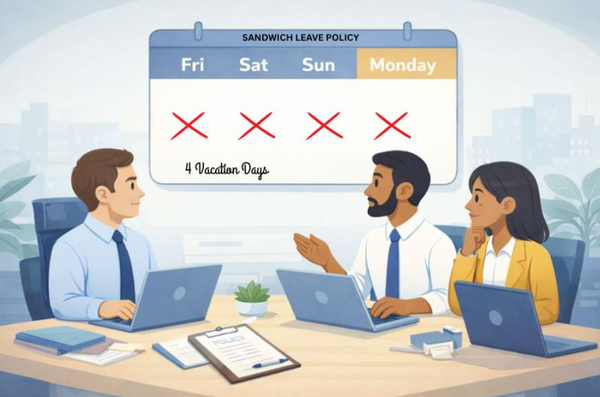Buddies HR’s List of Core Values for Teams in 2025
Explore Buddies HR's grouped examples of core values from 300+ businesses and follow a simple framework to create your own authentic and actionable value set.

Ever felt like your team’s just going through the motions?
That’s usually a sign your core company values are either missing or collecting dust on a slide deck.
Clear, authentic values shape your company culture and show everyone exactly how your organization’s values drive decisions, big and small.
If you’re rethinking what you stand for, or just want examples that don’t sound like generic slogans, you’re in the right place.

How to choose the right core company values
Before you copy-paste values from a list, take a moment to think about them. Your core values should ideally align with how your team operates and what you stand for.
That’s what separates strong company values from empty statements nobody thinks about after onboarding.
Start by asking a few simple but powerful questions:
- What kind of company culture are we trying to build?
- What behavior do we want to encourage or discourage?
- What beliefs shape our decision-making?
- What matters most to our team members and customers?
From there, look at your team’s strengths, the direction of your business strategy, and how you want your organization’s core values to support your long-term goals.
If your company's mission is focused on customer success, then customer focus, service excellence, or empathy might be strong contenders. If you’re a startup that needs new ideas, then innovation, risk-taking, or a growth mindset might be a better fit.
The key is to choose values that already appear in your day-to-day life, not just what sounds impressive on your “About” page.
78 Core company values (grouped with meaning)
We’ve taken inspiration from 300+ successful businesses to curate this list. Instead of dumping 78 values into one long scroll, we’ve grouped them so they’re easier to browse, and more useful when building your own core values framework.
1. Customer-Centric Values
These are essential for companies that care deeply about customer satisfaction and creating a great customer experience.
- Customer-centric – Putting the customer’s perspective first in every decision.
- Customer focus – Staying aligned with customer expectations and needs.
- Service excellence – Going beyond the basics to provide exceptional service.
- Empathy – Understanding and sharing the feelings of your customers.
- Care – Showing genuine concern for the people you serve.
2. Team & Culture Values
Strong teams build strong companies. These values support employee engagement, employee satisfaction, and a healthy organizational culture.
- Work-life balance – Respecting time and preventing burnout.
- Teamwork – Collaborating effectively across departments.
- Team player – Putting the group ahead of ego.
- Fun – Making space for lightness and joy.
- Inclusivity – Embracing different backgrounds and viewpoints.
- Diversity and inclusion – Creating equal opportunities and breaking bias.
- Respect – Valuing every individual’s contribution.
- Transparency – Keeping communication honest and open.
- Engaged coworkers – Encouraging participation and alignment.
3. Personal Drive & Responsibility
These values are common in fast-growing startups and companies focused on performance and ownership.
- Bias for action – Moving quickly and decisively.
- Ownership – Taking responsibility from start to finish.
- Accountability – Owning mistakes and results.
- Tenacity – Pushing through when things get tough.
- Grit – Staying committed in the face of obstacles.
- Personal responsibility – Holding yourself to a high standard.
- Discipline – Being consistent even when it’s hard.
4. Innovation & Growth
If your business values include constant evolution and creative thinking, these values can help guide your hiring, planning, and product development.
- Curiosity – Always asking why and what’s next.
- Innovation – Embracing new methods and thinking big.
- Creativity – Solving problems in new ways.
- New Ideas – Staying open to experimentation.
- Continuous learning – Never settling for what you already know.
- Growth mindset – Believing people can learn and improve.
- Providing continual technology releases – Moving fast without sacrificing quality.
5. Integrity & Ethics
These are foundational for companies aiming to build long-term trust and a strong moral compass.
- Integrity – Doing the right thing, even when it’s not the easy thing.
- Honesty – Speaking truthfully and acting transparently.
- Authenticity – Being real and consistent, not just polished.
- Candor – Giving clear, direct feedback and opinions.
- Ethical practices – Making decisions that align with higher values, not just profits.
- Respect – Treating others with dignity and professionalism.
6. Excellence & High Standards
These values are about pushing the company and its people to be their best, constantly striving for competitive advantage and business success.
- Excellence – Delivering outstanding quality, always.
- Raise the bar – Setting higher expectations every time.
- Quality – Taking pride in craftsmanship and details.
- Rigor – Applying discipline and precision in execution.
- Results-oriented – Focusing on outcomes over effort.
- Performance – Measuring success through impact and delivery.
7. Vision & Purpose
Great companies are driven by principles, not just profit. These values help clarify a company’s mission and help decide where it wants to go.
- Mission driven – Staying anchored in a deeper reason for existing.
- Purpose – Working toward something bigger than just revenue.
- Think long term – Making decisions that benefit the future.
- Positive impact – Wanting to leave the world better than you found it.
- Company forward – Prioritizing progress and growth over ego.
- Company stands – Clearly communicating what you believe in.
8. Inclusion & Social Impact
Today’s strong company culture often includes awareness of broader societal issues, especially if your business aims to promote social and economic justice or reduce environmental impact.
- Diversity – Embracing different perspectives.
- Equal opportunities – Ensuring fairness across roles and levels.
- Environmental initiatives – Caring about sustainability and carbon impact.
- Social and economic justice – Advocating for fair systems and access.
- Humanity – Valuing people over processes or politics.
- Compassion – Leading with heart, not just metrics.
- Positive influence – Being a force for good, inside and out.
9. Decision-Making & Ownership
These values create a culture where people feel accountable and empowered to move things forward, without waiting for permission.
- Ownership – Acting like it's your own company.
- Accountability – Taking full responsibility for your actions.
- Responsibility – Owning outcomes and following through.
- Disagree and commit – Sharing opinions, then aligning on execution.
- Pragmatic – Making sensible, grounded decisions.
- Thoughtfulness – Slowing down to consider implications.
- Decision making – Basing choices on logic, data, and values.
10. Agility & Experimentation
Fast-moving companies often value speed and adaptability, without sacrificing thoughtfulness.
- Urgency – Acting quickly when it counts.
- Velocity – Keeping momentum and minimizing delays.
- Speed – Removing friction from execution.
- Iteration – Testing and improving constantly.
- Bias for action – Taking the first step before everything is perfect.
- Adaptability – Adjusting when conditions change.
- Providing continual technology releases – Always shipping, always learning.
- Challenging the status quo – Never settling for “this is how we’ve always done it.”
11. Courage & Grit
For companies doing hard things, these values reflect determination, risk-taking, and emotional endurance.
- Courage – Facing hard truths or unpopular paths.
- Confidence – Believing in yourself, the team, and the vision.
- Boldness – Taking ambitious bets.
- Risk taking – Accepting uncertainty as part of growth.
- Tenacity – Refusing to give up easily.
- Resilience – Recovering quickly from setbacks.
- Relentlessness – Continuing to push when it’s tough.
- Grit – Sustained passion and perseverance.
12. Personal Values in a Work Context
Finally, some values blur the line between personal and professional, but still shape the brand and sense of purpose.
- Work-life balance – Supporting people as whole humans.
- Curiosity – Asking why, how, and what if.
- Growth mindset – Believing you can always improve.
- Empathy – Understanding others deeply.
- Kindness – Choosing decency over dominance.
- Care – Investing in people, not just roles.
- Employee satisfaction – Prioritizing how employees feel, not just what they do.
- Employee experience – Creating a positive journey for every team member, from onboarding to daily work.
- Encouraging employees – Creating a space where people feel supported.
- Engaged employees – Building a team that genuinely cares.
- Employees feel heard – Listening and responding to feedback.
How to define your own core company values
Creating strong company values isn’t about writing fancy words for a careers page. It’s about aligning your team around what matters most, especially when no one’s watching.
Here’s a simple, clear process to help you define your own values:
1. Start from your mission
Your company’s mission and vision statement should guide everything. What’s your purpose? What kind of impact do you want to make? The right values help keep you on track as you grow and develop.
2. Reflect on your culture
Observe how your team operates today. What behaviors do you encourage? What do you reward? Which values already show up in your company culture, and which ones are missing?
3. Get input
Talk to your team. Ask: What do we stand for? What makes us different? Listening across roles helps surface key values people actually live by, not just buzzwords.
4. Choose what matters most
You don’t need 20 values. Focus on a short list that’s meaningful, specific, and actionable. These should guide decision making, hiring, internal communication, and your day-to-day business operations.
5. Write them clearly
Avoid vague phrases. A good core value is concise, impactful, and supported by a brief explanation or example. You can even include what the value doesn’t mean to avoid confusion.
6. Make them visible
Once your values are final, integrate them everywhere, from your onboarding docs to your team retros to your customer support approach. Values only work if people use them.
Frequently Asked Questions
What’s the difference between company values and a mission statement?
Your mission statement defines why your company exists. Your company's core values define how you operate day to day. Together, they give direction to your organizational culture.
How many core values should a company have?
Most successful companies keep it between 3 and 7. Enough to guide behavior, but not so many that they become overwhelming and no one remembers them. Choose only the values that reflect your own values and shape your business practices.
Why do values matter for employee engagement?
Company values give employees a shared language. They help people understand what’s expected and take responsibility for outcomes.
Do core values benefit customers as well?
Absolutely. Strong values often lead to better communication and more consistent service. When your employees act with purpose, your customers notice.
Can values evolve over time?
Yes, and they should. As your business grows, revisit your values to make sure they still support your company's focus, priorities, and people. Just be cautious of changing them too often or diluting their meaning.
Final thoughts
You came here looking for ideas, inspiration, or just a bit of help refining your corporate values, and we hope this guide gave you exactly that.
Whether you're defining your first set of values or updating old ones, the most important thing is to make them actionable.
Core values aren't just words on your website. They're the guiding principles that shape your culture and influence your decisions. When done right, they strengthen your team and support your company's growth.
Now that you know this, use these examples as a starting point, then define the values that reflect your mission, your people, and the future you want to build.





